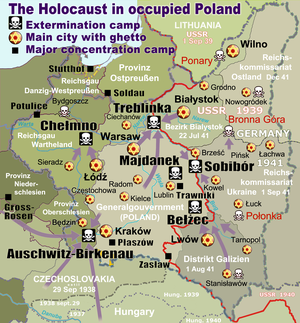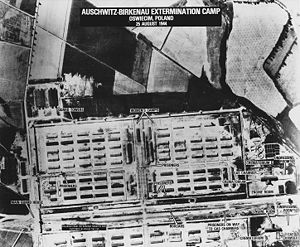Nazi deathcamp
| German extermination camps | |
|---|---|

Death Gate at Auschwitz II Birkenau
 The Holocaust map: Nazi extermination camps, marked with white skulls in black squares, set up by the SS in occupied Poland, 1942 |
|
| Also known as | German death camps |
| Location | German-occupied Europe |
| Date | World War II |
| Incident type | Extermination |
| Perpetrators | SS, Trawnikis, Ustaše |
| Organizations | SS-Totenkopfverbände |
| Camp | Chełmno, Bełżec, Sobibór, Treblinka, Auschwitz, Majdanek, Trostenets |
|
|||||||||||
| U.S. aerial photograph of Auschwitz II Birkenau with location of crematoria (to the right of red mark) |
The German extermination camps or death camps and killing centers were designed and built by Nazi Germany during World War II (1939–45) to systematically kill millions of Jews, Slavs, Communists, and others whom the Nazis considered "Untermenschen", primarily by gassing, but also in mass executions and through extreme work under starvation conditions.
The idea of mass extermination with the use of stationary facilities built exclusively for that purpose was a result of earlier Nazi experimentation with the chemically manufactured poison gas during the secretive Action T4 euthanasia programme against Germans with mental and physical disabilities. The technology was adapted, expanded and applied in wartime to unsuspecting victims of many ethnic and national groups; the Jews however were the primary targets accounting for over 90 percent of the extermination camp death toll. This genocide of the Jewish people of Europe was the Third Reich's "Final Solution to the Jewish question". It is now collectively known as the Holocaust.
Extermination camps were also set up by the fascist Ustaše regime of the Independent State of Croatia allied with Germany, carrying out genocidal policy between 1941 and 1945 against Serbs, Jews, Roma and its Croat and Muslim political opponents.
After the invasion of Poland in September 1939, the secret Action T4 euthanasia programme – the systematic murder of German, Austrian, and Polish hospital patients with mental or physical disabilities – was initiated by the SS in order to eliminate "life unworthy of life" (German: Lebensunwertes Leben), a Nazi designation for people who had no right to life. In 1941, the experience gained in the secretive killing of these hospital patients led to the creation of extermination camps for the implementation of the Final Solution. By then, the Jews were already confined to new ghettos and interned in Nazi concentration camps along with other targeted groups, including Roma, and the Soviet POWs. The Nazi Endlösung der Judenfrage (The Final Solution of the Jewish Question), based on the systematic killing of Europe's Jews by gassing, began during Operation Reinhard, after the onset of the Nazi-Soviet war of June 1941. The adoption of the gassing technology by Nazi Germany was preceded by a wave of hands-on killings carried out by the SS Einsatzgruppen, who followed the Wehrmacht army during Operation Barbarossa on the Eastern Front.
...
Wikipedia

